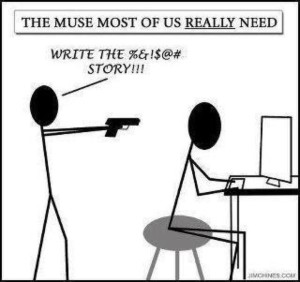The TV show Supernatural has gotten a reputation for being a show about two male models (who happen to be brothers) who hunt paranormal creatures, while repeatedly coming back from the dead. Much like the seasons and story arcs after the end of Eric Kripke’s Era of the first five seasons. So we’re not going to talk about those, or I’d be here all night.
The first season of Supernatural opens with a prologue. Family settles down for the night. Mother hears a noise and goes to check on her infant son, Sam. Father goes to check on his wife, and finds her on the ceiling. Bleeding. And then on fire.
So, hello there inciting incident to the overall story arc! Character motivation and high-stakes villain, so nice of you to join us so soon!
And then it does something very subtle, but important. The father hands off the infant to the six year old Dean, telling him “Take your brother outside as fast as you can. Don’t look back.” Translated? “Protect your brother and keep him safe. That’s the most important thing.”
The child cradles his infant brother and tells him, “It’s okay, Sam.” And then he looks up to the room consumed by flames and the family that was there. He looked back.
His father snatches them both away before the fire bursts out of the windows and doors.
Title screen.
Like oh, wow, okay, so that happened. And then what?
Cut to Halloween at Stanford, ‘present day’. Sam is grown up and has a seemingly normal life. A girlfriend. Excellent LSAT scores and his choice of a full-ride at just about any law school he wants. But then Dean shows up, looking like he doesn’t want to be there, and asks for help. “Dad’s on a hunting trip, and he hasn’t been home for a few days.” And Sam knows exactly what Dean means.
Our only indication outside of the, you know, title, that this is about paranormal hunters is the strangeness of the circumstances in the prologue.
You can tell that Sam and Dean are a bit estranged, and it’s revealed that Sam didn’t like growing up in a transient lifestyle of constantly hunting monsters. Dean wasn’t much into it either, but he saw it as a necessity, because he was old enough to remember the stakes and what he’s lost. And now he risks losing his father, too.
So with a truck full of guns, hatchets, and silver-bullets, they drive off together, on the road again in a black ‘67 Chevy Impala while nostalgic rock music plays in the background.
And as the story progresses, as each new season is introduced, the stakes are raised higher, and higher. ((We’re going to ignore the episode with the possessed racist truck ghost.))
First, there’s the yellow-eyed demon who killed their mother. He is amassing an army of demons, who are near impossible to kill at this point, for God knows what. ((Except God is missing, but we’ll get to that later.))
At first, they risk losing each other. Then their father, who they do lose, and it’s just them. And then they risk losing each other, again, because one’s dead, then not, and the other is destined for hell in a year.
Whew, okay, deep breath.
Stopped the demon army, learned about family and being there for each other, and reinforced the bond that was established when they were very young. Dean will do anything, anything, up to and including “Promise your immortal soul to the enemy that killed your father and mother” to protect his little brother.
Sam is just as loyal to Dean. He wants to try to find a way around
And then an angel literally grips Dean tight and raises him from perdition. Oh, yeah, now there are angels, too. They’re not all good, let alone on our duo’s side. In fact some of them are actively working against them, on top of all the demons they have to deal with.
They get a blade that can take care of demons, and oh look, now there’s another Big Bad even more powerful than the first one! And the seals that keep Lucifer locked away are being broken faster and faster. You gotta move, boys. Gotta figure this out.
So angels and demons are all warring amongst themselves and with the Winchester boys as they try to cause or stop a full on Apocalpyse, and God is still missing.
Until he isn’t.
And you think, oh, wow. So is God going to be on the Winchester’s side and fight the devil himself with a set of unified angels behind him? Are the Winchesters going to have to fight frickin’ God now?
And sadly, no, the God figure is more of a literal author who just organizes the world and lets the characters have free will to play out the story as they see fit.
Which means, they have to take down Lucifer themselves. Together. After all they’ve been through. But to do so, they might have to lose each other (…again.)
Took notes? All caught up? Good.
One of the writing lessons I took away from this series was how compelling, emotionally charged characters with a deep connection to each other (and a lot of humor, rock and roll, and self-awareness thrown in) can still drive a story when the plot seems to consist of the “…and…?” impromptu technique.
Now the series has 11 seasons and is being renewed for a 12th. Tumblr and DeviantArt and every other fandom forum out there are still talking about the show and analyzing the details in it years later. I’m pretty sure half the internet right now is Supernatural .gifs.
So, find something about your story, some aspect that you do really, really well. Work it. Respond to the fans and rework it to give them more of what they want.


